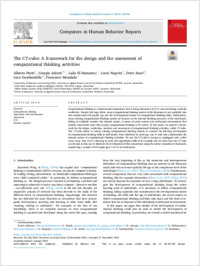The CT-cube : a framework for the design and the assessment of computational thinking activities
- Piatti, Alberto ORCID Department of Education and Learning (DFA), University of Applied Sciences and Arts of Southern Switzerland (SUPSI), Locarno, Switzerland
- Adorni, Giorgia ORCID Istituto Dalle Molle di studi sull'intelligenza artificiale (IDSIA), Facoltà di scienze informatiche, Università della Svizzera italiana, Svizzera
- El-Hamamsy, Laila ORCID Mobile Robotic Systems Group (MOBOTS), Ecole Polytechnique Fédérale de Lausanne (EPFL), Lausanne, Switzerland
- Negrini, Lucio ORCID Department of Education and Learning (DFA), University of Applied Sciences and Arts of Southern Switzerland (SUPSI), Locarno, Switzerland
- Assaf, Dorit ORCID School of Education, University of Applied Sciences and Arts Northwestern Switzerland, Windisch, Switzerland
- Gambardella, Luca Dalle Molle Institute for Artificial Intelligence (IDSIA), USI-SUPSI, Lugano, Switzerland
- Mondada, Francesco ORCID Mobile Robotic Systems Group (MOBOTS), Ecole Polytechnique Fédérale de Lausanne (EPFL), Lausanne, Switzerland
- 2022
Published in:
- Computers in Human Behavior Reports. - 2022, vol. 5, p. 100166
English
Computational thinking is a fundamental competence that is being introduced in K-12 and succeeding curricula worldwide. Despite this huge effort, many computational thinking models in the literature do not explicitly take into consideration the pupils’ age and the developmental nature of computational thinking skills. Furthermore, many existing computational thinking models are focused on the internal thinking processes of the individuals, failing to explicitly consider the situated nature, in terms of social context and artefactual environment, that usually characterise tasks that require computational thinking to be solved. In this paper, we present a framework for the design, realisation, analysis, and assessment of computational thinking activities, called CT-cube. The CT-cube allows to extend existing computational thinking models to consider the life-long development of computational thinking skills in individuals, from childhood to adult age, and to take into consideration the situated nature of computational thinking activities. We use the CT-cube to design an unplugged task, called Cross Array Task (CAT), allowing to assess the algorithmic skills of K-12 pupils and we show how the CT-cube can be used in this case to illustrate the development of this competence along the entire compulsory school path, considering a sample of 109 pupil aged 3 to 16 in Switzerland.
- Collections
- Language
-
- English
- Classification
- Computer science and technology
- License
- Open access status
- gold
- Identifiers
-
- DOI 10.1016/j.chbr.2021.100166
- ARK ark:/12658/srd1322452
- Persistent URL
- https://n2t.net/ark:/12658/srd1322452
Statistics
Document views: 165
File downloads:
- Adorni_2021_Else_chbr: 155
